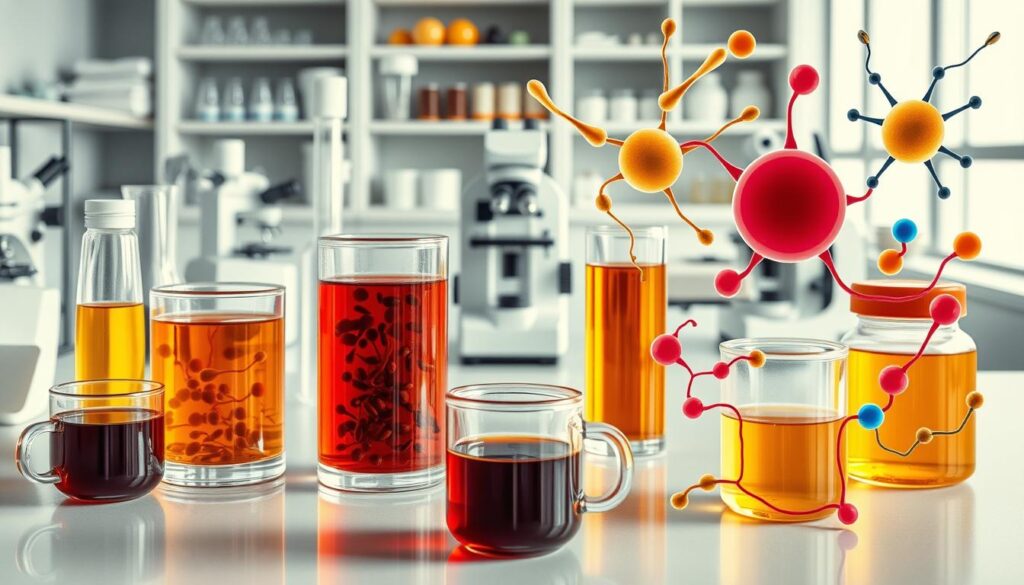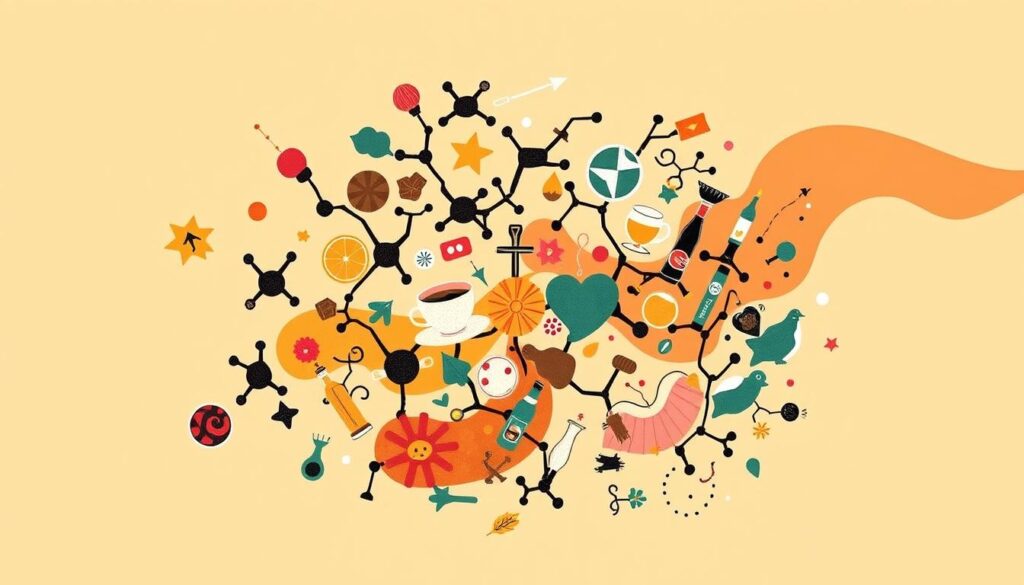In today’s world, we often rely on caffeine to get through the day. From that first cup of coffee in the morning to an afternoon energy drink. But have you thought about how caffeine affects your reproductive health? Male infertility impacts many, causing stress for those wanting to start a family. Around 13% of couples face fertility challenges, with male factors playing a role in 30% of these cases. Studies also show a global decrease in sperm quality, making it important to understand how caffeine affects male fertility.
Caffeine comes from coffee, sodas, and energy drinks and helps keep us going. But, have you wondered if it affects your chances of having a baby? This article will explore how caffeine and male infertility are connected. It aims to give you the information needed to make smart choices about your lifestyle.
Key Takeaways
- Approximately 13% of the reproductively active population experiences fertility problems.
- Male factors contribute to about 30% of infertility cases.
- Caffeine has been linked to decreased sperm quality in some studies.
- Excessive caffeine intake may elevate the risk of reproductive health issues.
- Moderate caffeine consumption typically shows no adverse effects on sperm parameters.
Understanding Male Infertility
Male infertility affects about 13% of those trying to have a baby. In these cases, male issues cause nearly 30% of infertility. Almost half of these problems are due to poor sperm production.
Stress has a big impact on sperm quality. Research links high stress levels to less sperm and weaker movement. A study found out stress reduces sperm concentration by 39% and motility by 48% during key fertility treatments.
Bad lifestyle choices also play a part. Unhealthy eating, not exercising, and too much caffeine harm fertility. Men with fertility issues often feel anxious or depressed. This shows how important mental health is in these challenges.
Things like wars and natural disasters add extra stress. It’s hard to measure, but stress usually means lower sperm counts and movement. This is worrying for public health, especially concerning male fertility.
| Factor | Impact on Male Infertility |
|---|---|
| Poor Spermatogenesis | Accounts for 50% of infertility occurrences |
| Psychological Stress | 39% decrease in sperm concentration, 48% decrease in motility |
| Anxiety and Depression | Common in men undergoing infertility treatment |
| Environmental Stressors | Impact on overall fertility levels, hard to quantify |
| Lifestyle Factors | Diet, exercise, and caffeine affect reproductive health |
What is Caffeine?
Caffeine is known as 1,3,7-trimethylxanthine in the science world. It’s a natural substance that affects the brain, making us feel more alert. It’s found in our favorite drinks like coffee, tea, and energy drinks, plus chocolate. After we drink or eat caffeine, it quickly moves to our bloodstream. It reaches its highest level in just 15 to 45 minutes.
This stimulant helps us feel more awake and focused. It’s really helpful for staying alert during the day or night. However, drinking too much caffeine can lead to problems. These include heart issues and feeling more anxious. It’s important to know about these effects, especially how caffeine might affect men’s health.

The Effects of Caffeine on the Male Reproductive System
Caffeine impacts both the brain and the male reproductive system. It might change testosterone levels, important for reproductive health. High caffeine levels could mess up the needed hormonal balance for good reproductive working.
Caffeine’s effect on Sertoli cells is also key. These cells help sperm develop. Studies show that caffeine might change how Sertoli cells work. This could affect sperm quality and fertility.
Caffeine also influences hormones related to testicular function. This adds to its complex role in male fertility. Understanding caffeine’s effects involves looking at how different amounts impact the body.

Studying caffeine and male health could give us valuable information on fertility issues. Think about your caffeine intake’s possible effects on your reproductive and overall health.
Relation Between Caffeine and Male Infertility
Looking into how caffeine affects male infertility means looking at sperm and fertility studies. Research gives us mixed signals about caffeine’s impact on men’s health. While some findings raise concerns, others show it might not be harmful or could even help.
Studies Linking Caffeine Consumption and Sperm Quality
Many studies have looked at caffeine and sperm quality. They found that coffee drinking men, in moderation, usually don’t see harm in sperm health. However, caffeine from sodas, like cola, could lower sperm amount and quality.
For example, drinking lots of caffeine can lead to a 39% drop in sperm. This shows how complex the effect of caffeine on fertility can be.
Caffeine’s Impact on Hormones and Testicular Function
Caffeine can also affect hormones and testicle health, adding to the complexity. Some research suggests too much caffeine might disrupt hormone levels. This could hurt the testicles’ ability to function properly.
Although some studies link high caffeine with fewer sperm, the results aren’t the same everywhere. That’s why it’s important to keep researching. We need to fully understand how caffeine affects men’s reproductive health.

How Caffeine Consumption Affects Semen Quality
Research is mixed on how caffeine affects sperm health. Studies reviewed the sperm of 12,912 men to understand better. They used the Newcastle-Ottawa Scale and got different scores for each study.
Men who drank a little caffeine, around 100 mg a day, seemed to have almost no change in sperm health. Those who had a moderate amount of caffeine had a slight risk increase. But a lot of caffeine, over 400 mg, raised concerns about sperm quality.
Too much caffeine, especially from cola, might reduce sperm count and concentration. This can make semen quality worse. It might even take longer for couples to conceive if the man drinks a lot of caffeine.
It’s important to know how caffeine and fertility are connected. Those thinking about drinking more caffeine should consider how it could affect sperm health. Moderation is key for those looking to maintain good semen quality.
| Caffeine Intake Level | Odds Ratio (OR) | Relative Risk (RR) (Miscarriage) | Relative Risk (RR) (Stillbirth) | Relative Risk (RR) (Premature Delivery) | Relative Risk (RR) (Low Birth Weight) | Relative Risk (RR) (SGA Infants) |
|---|---|---|---|---|---|---|
| Low (approx. 100 mg/day) | 0.95 | 1.14 | 1.19 | 1.02 | 1.07 | 1.10 |
| Medium | 1.14 | 1.14 | 1.19 | 1.02 | 1.07 | 1.10 |
| High (>400 mg/day) | 1.86 | 1.14 | 1.19 | 1.02 | 1.07 | 1.10 |

Dietary Habits and Lifestyle Choices
Your dietary choices and lifestyle greatly affect male fertility. Understanding the effects of stress and caffeine on reproductive health is key. It’s noted that 13% of people trying to have kids face fertility issues. This shows the need to focus on both mental and physical health.
The Role of Stress in Male Fertility
Research shows stress can harm spermatogenesis and lower sperm quality. Men in infertility treatment often feel more stressed, worsening fertility issues. It’s important to see how stress and fertility are linked to treat these problems fully.
Dietary Patterns Linked to Caffeine Consumption
Nowadays, diets often include a lot of caffeinated drinks, affecting male fertility. Caffeine is fully absorbed when taken orally and peaks in the blood within 15 to 45 minutes. Even though some studies point to slight negative effects of caffeine from soda on sperm, coffee hasn’t been linked to bad sperm health.
Making the right dietary choices is crucial for reproductive health. For example:
| Dietary Pattern | Impact on Male Fertility |
|---|---|
| Caffeinated Beverages | Little to no adverse effects noted when consumed in moderation, but excessive intake may lead to concerns. |
| High-Fat Diets | Linked to decreased sperm parameters and lowered fertilization success rates. |
| Fertility Diet | May prevent cases caused by ovulatory disorders. |

Evaluating caffeine intake and managing stress is a holistic way to boost fertility. By adjusting your diet and reducing stress, you can enhance your chances of better reproductive results.
Moderate vs. Excessive Caffeine Intake
It’s important to know the difference between moderate and too much caffeine. This knowledge is key for keeping healthy. This is especially true for male reproductive health. Many people have caffeine every day. But, knowing how much is okay is crucial to avoid health issues.
Safe Levels of Caffeine Consumption
Experts say up to 200 mg of caffeine a day is fine. That’s like one 12-ounce coffee. Moderate amounts include:
- A single cup of brewed coffee with about 95 mg
- An 8-ounce black tea with 47 mg
- Standard colas with 30-50 mg per 12 ounces
Over 60% of adults have caffeine daily. So, it’s important to keep track of how much you’re getting. The caffeine amount can change a lot. It depends on the brand and how it’s made. Being aware helps you not to have too much.
Consequences of High Caffeine Intake
Having too much caffeine, like over 400 mg a day, can be harmful. This is about four 8-ounce coffees. Women having more than 500 mg a day may find it harder to get pregnant. It can also affect hormone levels and lower sperm quality. Knowing these risks is critical, especially for those looking to have kids.

Recommendations for Caffeine Intake
Knowing how much caffeine to consume is important for men trying to improve fertility. Experts suggest that 101 to 800 mg of caffeine daily is okay. This is often the amount found in coffee, which is safer than many other caffeinated drinks.
It’s wise to watch where your caffeine comes from, especially with cola and soft drinks. Such drinks have a lot of sugar. This can affect how caffeine impacts male fertility. Studies show that cola might lower semen quality.
Here’s a summary of how caffeine affects male fertility:
| Caffeine Intake Source | Common Effects on Male Fertility |
|---|---|
| Coffee | Generally shows no significant negative effects on semen parameters. |
| Tea | Similar to coffee, not significantly impacting fertility outcomes. |
| Cola Drinks | Associated with reduced semen volume and concentration. |
| Energy Drinks | Some evidence suggests negative effects on fertility; moderation is key. |
Focus on keeping your caffeine intake low to moderate. This helps with health and fertility. Since everyone is different, monitor how caffeine affects you.

Conclusion
In summarizing caffeine’s role with male fertility, understanding that moderate caffeine intake may not hugely impact sperm quality is key. But, high caffeine levels can bring risks. An increase in caffeine has been linked to issues with sperm movement and number. These are vital for reproductive health. So, how much caffeine you consume should be thought about in your fertility health plans.
Adopting good eating habits can really help your chances of having kids. Studies show that caffeine might not change the time it takes to conceive. But, the health of your reproductive parts, like sperm, can be affected by your lifestyle choices. Managing your caffeine intake well could boost your chances of having a child and support your fertility health.
For those looking to better their fertility health, living a balanced life is key. This includes keeping your caffeine intake in check, handling stress well, and eating right. Finding the balance between enjoying life and staying healthy is important for a hopeful path to having a baby. It’s critical to watch your caffeine choices closely.








